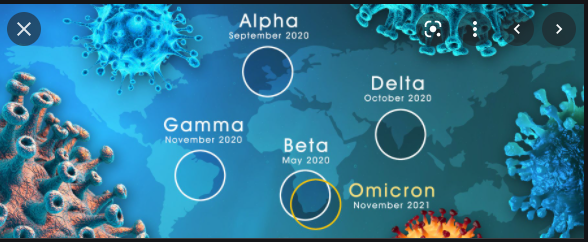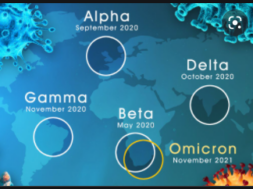
Covid-19: Pandemic not in the endgame; more variants may follow, warns WHO
Virendra Pandit
New Delhi: Just when India thought, in February 2021, that it was in the ‘endgame’ of Covid-19, the pandemic’s second wave soared, claiming more lives in three months than the first wave had done in a year. Now the World Health Organization (WHO) has warned against such a similar misplaced optimism.
On Monday, the health agency’s chief warned conditions remained ideal for more coronavirus strains to emerge and that it is dangerous to assume that the current, highly contagious Omicron is the last variant, or that “we are in the endgame.”
But the acute phase of Covid-19 could still taper off this year (2022) if we meet some key targets, said WHO’s Director-General Tedros Adhanom Ghebreyesus.
“There are different scenarios for how the pandemic could play out and how the acute phase could end. But it’s dangerous to assume that Omicron will be the last variant or that we are in the endgame,” he said at a WHO executive board meeting.
“On the contrary, globally, the conditions are ideal for more variants to emerge.”
“We can end Covid-19 as a global health emergency, and we can do it this year, by reaching goals like WHO’s target to vaccinate 70% of the population of each country by the middle of this year, with a focus on people who are at the highest risk of Covid-19, and improving testing and sequencing rates to track the virus and its emerging variants more closely.”
According to media reports, although highly transmissible, Omicron is less likely to cause severe illness than the previous Delta variant is. Omicron spreads even more easily than other coronavirus strains and has already become dominant in many countries. It also more easily infects those who have been vaccinated or had been infected by prior versions of the virus.
Dr. Ghebreyesus said, “It’s true that we will live with Covid-19 for the foreseeable future and that we will need to learn to manage it through a sustained and integrated system for acute respiratory diseases to help prepare for future pandemics. But learning to live with Covid-19 cannot mean that we give this virus a free ride. It cannot mean that we accept almost 50,000 deaths a week from a preventable and treatable disease.”
He also appealed for strengthening WHO and increasing funding for it to help stave off health crises.
“Let me put it plainly: If the current funding model continues, WHO is being set up to fail,” he said. “The paradigm shift in world health that is needed now must be matched by a paradigm shift in funding the world’s health organization.”
In a related development, Dr. Hans Kluge, who heads WHO’s European region, said Omicron offers plausible hope for stabilization and normalization. But he also cautioned: “Our work is not done.”
Citing “huge disparities” in access to vaccines, he echoed concerns from other WHO officials that some areas, where people are less immunized, could allow the virus to adapt and possibly lead to new variants.
“It is almost a given that new Covid-19 variants will emerge and return,” he said, advocating the continuation of protocols like strong surveillance of new variants, high vaccination uptake, regular ventilation of indoor areas, affordable, fair access to antiviral drugs, targeted testing, mask-wearing, and physical distancing.
“If a new variant appears, I believe that a fresh wave could no longer require the return to pandemic-era population-wide lockdowns or similar measures,” he added.













